宾语从句和表语从句
名词性从句的三种类型及例句解析
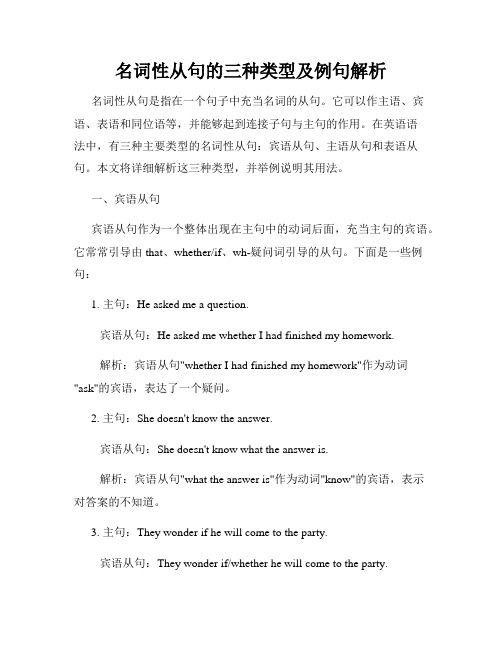
名词性从句的三种类型及例句解析名词性从句是指在一个句子中充当名词的从句。
它可以作主语、宾语、表语和同位语等,并能够起到连接子句与主句的作用。
在英语语法中,有三种主要类型的名词性从句:宾语从句、主语从句和表语从句。
本文将详细解析这三种类型,并举例说明其用法。
一、宾语从句宾语从句作为一个整体出现在主句中的动词后面,充当主句的宾语。
它常常引导由that、whether/if、wh-疑问词引导的从句。
下面是一些例句:1. 主句:He asked me a question.宾语从句:He asked me whether I had finished my homework.解析:宾语从句"whether I had finished my homework"作为动词"ask"的宾语,表达了一个疑问。
2. 主句:She doesn't know the answer.宾语从句:She doesn't know what the answer is.解析:宾语从句"what the answer is"作为动词"know"的宾语,表示对答案的不知道。
3. 主句:They wonder if he will come to the party.宾语从句:They wonder if/whether he will come to the party.解析:宾语从句"if/whether he will come to the party"作为动词"wonder"的宾语,表达了对他是否会来参加派对的疑问。
二、主语从句主语从句作为一个整体出现在句子的最前面,充当主句的主语。
它通常由that引导,也可以由wh-疑问词引导。
以下是一些例句:1. 主句:It is important to learn a foreign language.主语从句:That she is a hardworking student is important.解析:主语从句"That she is a hardworking student"作为句子的主语,强调了她是一个勤奋的学生的重要性。
4. 宾语从句和表语从句
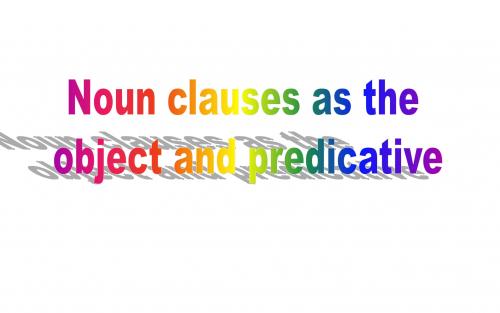
(4) 一些动词, 如find, think, make, consider, feel, see, hear等, 可以构成 “主语+ 谓语 +宾 语+ 宾语补足语”的结构, 其中常用it作形式 宾语,真正的宾语用that引导, that不可省。 I found it strange that he had not come yet. (5)如果宾语从句含有主从复合句 that一般不 省略。 They promised me that if I worked hard, they would buy me a computer.
As long as you love me Although loneliness has always been a friend of mine. I'm leaving my life in your hands. People say I'm crazy that I am blind. Risking it all in a glance. How you got me blind is still a mystery. I can't get you out of my head. Don't care what is written in your history. As long as you're here with me. I don't care who you are, where you're from, what you did.
(二) 由whether,if 引导的宾语从句 1. 只能用whether,不能用if引导的宾语 从句 (1) 在不定式前 We decided whether to walk there. (2) 在介词的后面 I’m thinking of whether we should go to see the film.
表语从句与宾语从句详解及练习
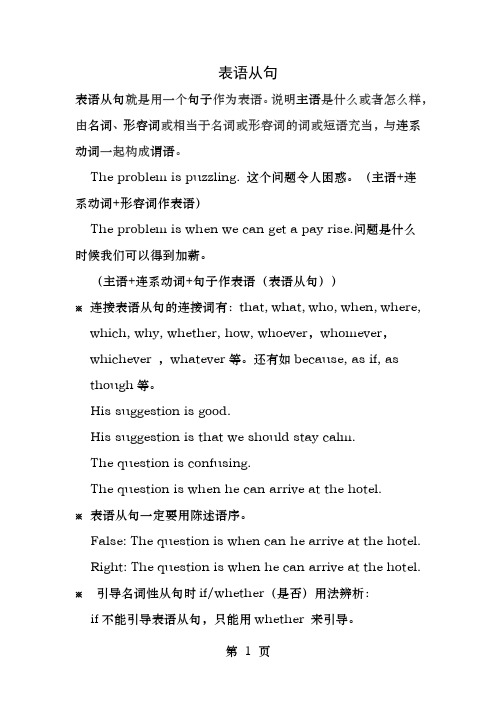
表语从句表语从句就是用一个句子作为表语。
说明主语是什么或者怎么样,由名词、形容词或相当于名词或形容词的词或短语充当,与连系动词一起构成谓语。
The problem is puzzling. 这个问题令人困惑。
(主语+连系动词+形容词作表语)The problem is when we can get a pay rise.问题是什么时候我们可以得到加薪。
(主语+连系动词+句子作表语(表语从句))※连接表语从句的连接词有:that, what, who, when, where, which, why, whether, how, whoever,whomever,whichever ,whatever等。
还有如because, as if, as though等。
His suggestion is good.His suggestion is that we should stay calm.The question is confusing.The question is when he can arrive at the hotel.※表语从句一定要用陈述语序。
False: The question is when can he arrive at the hotel.Right: The question is when he can arrive at the hotel.※引导名词性从句时if/whether(是否)用法辨析:if不能引导表语从句,只能用whether 来引导。
引导宾语从句时if/whether可以互换,但介词后面的宾语从句只能用whether来引导。
位于句首的主语从句只能用whether来引导,同位语从句也只能用whether来引导。
False: The question is if the enemy is marching towards us.Right: The question is whether the enemy is marching towards us.※不像宾语从句,在有表语从句的复合句中,主句时态与从句时态可以不一致。
表语从句宾语从句
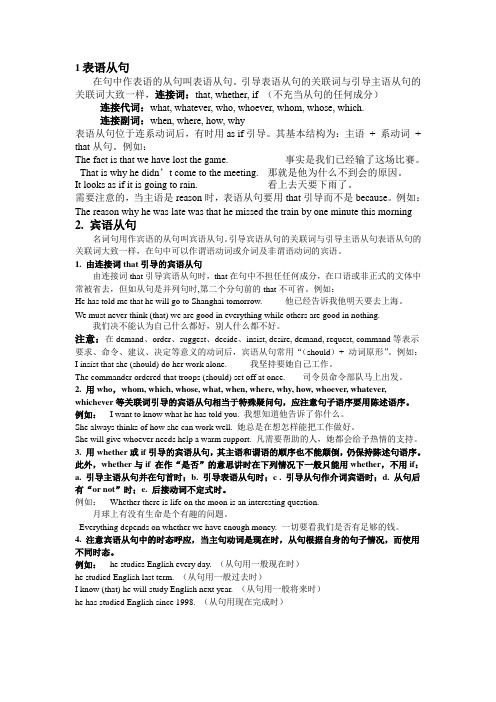
1表语从句在句中作表语的从句叫表语从句。
引导表语从句的关联词与引导主语从句的关联词大致一样,连接词:that, whether, if (不充当从句的任何成分)连接代词:what, whatever, who, whoever, whom, whose, which.连接副词:when, where, how, why表语从句位于连系动词后,有时用as if引导。
其基本结构为:主语+ 系动词+ that从句。
例如:The fact is that we have lost the game. 事实是我们已经输了这场比赛。
That is why he didn’t come to the meeting. 那就是他为什么不到会的原因。
It looks as if it is going to rain. 看上去天要下雨了。
需要注意的,当主语是reason时,表语从句要用that引导而不是because。
例如:The reason why he was late was that he missed the train by one minute this morning 2. 宾语从句名词句用作宾语的从句叫宾语从句。
引导宾语从句的关联词与引导主语从句表语从句的关联词大致一样,在句中可以作谓语动词或介词及非谓语动词的宾语。
1. 由连接词that引导的宾语从句由连接词that引导宾语从句时,that在句中不担任任何成分,在口语或非正式的文体中常被省去,但如从句是并列句时,第二个分句前的that不可省。
例如:He has told me that he will go to Shanghai tomorrow. 他已经告诉我他明天要去上海。
We must never think (that) we are good in everything while others are good in nothing.我们决不能认为自己什么都好,别人什么都不好。
宾语从句和表语从句详解
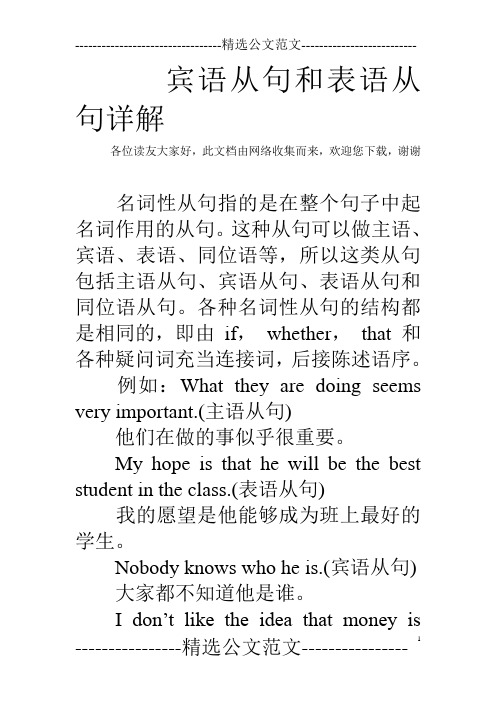
宾语从句和表语从句详解各位读友大家好,此文档由网络收集而来,欢迎您下载,谢谢名词性从句指的是在整个句子中起名词作用的从句。
这种从句可以做主语、宾语、表语、同位语等,所以这类从句包括主语从句、宾语从句、表语从句和同位语从句。
各种名词性从句的结构都是相同的,即由if,whether,that和各种疑问词充当连接词,后接陈述语序。
例如:What they are doing seems very important.(主语从句)他们在做的事似乎很重要。
My hope is that he will be the best student in the class.(表语从句)我的愿望是他能够成为班上最好的学生。
Nobody knows who he is.(宾语从句)大家都不知道他是谁。
I don’t like the idea that money iseverything.(同位语从句)我不喜欢金钱就是一切这一观点。
引导名词性从句的连接词中,除了that,if和whether之外其它的都作从句中的一个成分。
宾语从句在句子中作动词或介词宾语的从句叫做宾语从句。
引导宾语从句的词有连词that,whether,if;连接代词who,which,what以及其强调形式whoever,whichever,whatever; 连接副词when,where,why,how等。
例如:Do you know where the Greens live?I have no interest in how rich he is.宾语从句主要用于下面五种结构:1.由that引导的宾语从句(that 引导宾语从句时,特别是在口语中可省略) The boy believes that he will travel through space to other planets.that引导的宾语从句多用于say,think,insist,wish,hope,demand,imagine,wonder,know,suppose,see,believe,agree,admit,deny,expect,explain,order,command,feel,dream,suggest,hear,mean,notice,prefer,request,require,propose,declare,report等后。
宾语从句和表语从句的用法
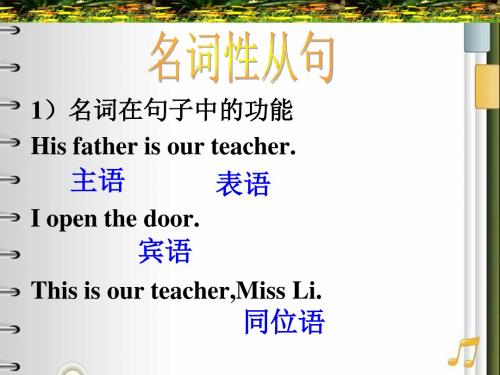
This is how we overcome the difficulties. ....的办法 That is why she was absent yesterday. ....的原因 This is where you made a mistake. ...的地方
关联词比较
whether / if whether / if 1.Please tell me you will go to the lecture tomorrow. 2. It all depends on whether the sky will clear up. whether 3. The question is the film is well worth seeing. 4. whether He will be well tomorrow I am not sure. 5. whether it is true remains a problem.
• She doesn’t care about when he will finish the job. • Will you tell me how I can keep fit and healthy?
无意义 主、宾、表 连词: that, if, whether 连接代词: who, which,what, whom, 宾 whose, 定 连接副词: where, when, how, why
无义 1. The mother’s question was that she has no time to look after her daughter. 是否 2.The question is whether that boy will turn up in time. 3.She speaks as if she was an adult. It looks as if it is going to rain.
表语从句与宾语从句的关系
表语从句与宾语从句的关系宾语从句和表语从句都属于名词性从句。
其作用跟名词在句中的作用相同。
故充当宾语的句子叫宾语从句,充当表语的句子叫表语从句。
宾语从句(1)对于宾语从句要掌握以下三点①语序: 从句的语序必须是陈述句语序, 即“主语+ 谓语”这种形式。
②时态: 当主句是一般现在时或一般将来时的时候, 从句可以是任何时态, 而当主句是一般过去时的时候, 从句, 从句时态必须是过去时范围的时态, 即(一般过去时, 过去进行时, 过去完成时, 过去将来时)。
③连接词: 当从句意思完整, 主句意思肯定时, 连接词用that, 且可以省去, 当从句意思完整, 主句意思不确定或含否定含意时, 常用if或whether(是否), 当从句意思不完整时, 连接词则是代替不完整部分的特殊疑问词。
表语从句在句子中起表语作用的从句叫做表语从句,位于主句系动词的后面。
表语从句的引导词和主语从句的引导词相同。
也是名词性从句的一种。
如:What the police want to know is when you entered red the room警察想知道的是你什么时候进的房间。
The trouble is that we are short of funds困难是我们缺乏资金。
This is what we should do这是我们应当做的。
That…s why I want you to work there那就是我要你在那儿工作的原因。
His first question was whether Mr. Smith had arrived yet他的第一个问题是史密斯先生到了没有。
注意:从句中的疑问句用正常语序,即陈述语序。
as if, as though, because也可用来引导表语从句。
She seems as if she had done a great thing她看起来好像做了一件大事。
It is because you eat too much是因为你吃得太多了。
宾语从句和表语从句
宾语从句的时态
(1)当主句为现在时或将来时, 宾语从句的时态一般 不受主句的时态影响。(按实际需要) ①We know that he worked _______ (work)from Monday to Friday these days. have telephoned ②We know you ______________(telephone) him.
b. 我知道他是诚实的孩子。 I know (that) he is an honest boy. _____________________________
②若由and连接两个或两个以上的并列宾语从句, 第
一个that可省略, 第二个及以后的that都不可省略。 Bill said that he didn’t like the party and he wanted to go home right away.(单句改错) 在and和he之间加that _____________________
3.主句+what等疑问词+从句
1.that引导的宾语从句。 ①当宾语从句是陈述意义时, 由连词that引导, that在 从句中不作任何成分, 也没有具体意思, 可省略。 a. 他说他玩得很高兴。
He said (that) he had a good time. ______________________________
连接词在句中既起连接作用, 又在从句中作成分, 且各 有各的词义, 此时从句使用陈述语序。
1. He asked_____ who could answer the question . when/wherewe’ll have a meeting? 2. Do you know_________ 3. Please tell me where/who _________ he is . how I can get to the station? 4. Can you tell me _____ why the train is late? 5. Could you tell me _____
宾语从句,状语从句,定语从句,表语从句的详细讲解及例句
当我们学习语法时,我们常常会遇到几种从句,包括宾语从句、状语从句、定语从句和表语从句。
下面逐个进行详细讲解,并给出相应的例句。
1. 宾语从句(Object Clause):宾语从句用来做主句中的宾语。
它通常由连接词引导,如that, if, whether, what, where, who, whom, whose等。
例句:- I don't know what he wants.(我不知道他想要什么。
)- She asked if he could come to the party.(她问他是否能来参加派对。
)- They wonder where we are going.(他们想知道我们要去哪里。
)2. 状语从句(Adverbial Clause):状语从句用来修饰主句中的动词、形容词、副词,表示时间、地点、原因、条件、结果等。
它通常由连接词引导,如when, while, because, if, although, since等。
例句:- We will go hiking if the weather is good.(如果天气好,我们将去远足。
)- He studied hard until he passed the exam.(他学习努力直到通过考试。
)- Although it was raining, they still went out.(虽然下雨了,他们仍然出去了。
)3. 定语从句(Relative Clause):定语从句用来修饰主句中的名词或代词,对其进行限定或说明。
它通常由关系代词引导,如that, which, who, whom, whose等。
例句:- The book that I bought yesterday is very interesting.(我昨天买的那本书很有趣。
)- The person who is talking to Mary is my brother.(正在和玛丽说话的那个人是我哥哥。
名词性从句(宾语从句、表语从句、主语从句)
名词性从句(宾语从句、表语从句、主语从句)六大基本句型1主系表句型-----be(连系动词do)2、主谓宾-----do(vt)3、主谓----- do(vi)----(不及物动词)4、主谓宾补----do(vt)5、主谓宾宾---do(vt) 记双宾语的动词一定要记。
6、Therebe(不及物动词do)--------be (不及物动词)宾语从句定义:在主谓宾句型的宾语的位置上把做为名词的宾语扩展成一个be句型或者do句型。
可以用下列公式进行表示:主语+谓语+从句。
宾语从句的连词①that ,②whether(or not)或if;③which(whichever), who(whoever),whom(whomever) ,whose(whosever),what(whatever);④when(whenever),where(wherever),why,how(however);⑤ how many, how much, how long, how often,how soon宾语从句的形式:1、主谓宾句型的宾语从句:做为名词的宾语扩展成一个be句型或者do句型。
He knows the newsHe knowsthatthe teacher is in classroom2、主谓宾宾---do(vt) 句型的宾语从句,把直接宾语变为一个be 或do句型。
He tells me the newsHe tells the newstomeHe tells methat sheisa teacherHe tellsthat she is a teacherto me3、主谓宾补句型的宾语从句需要it来做形式宾语IfindChineseimportant主谓宾补I find that we make a quick decision about this matterimportant主谓宾语从句补I find it important that we make a quick decision about this matter主谓形式宾语补宾语从句I think it necessary that we take plenty of hot water every day .我认为每天多喝开水是有必要的.I feel it a pity that I haven’t been to the get-together.我没去聚会,感觉非常遗憾.I have made it a rule that I keep diaries.我每天写日记成了习惯.4、宾语从句的省略形式:某些形容词后面可以带宾语从句,其形式为sb+be+形容词+that宾语从句:这一类形容词通常是表示人物的心理,情感等状态的形容词如:sure,certain,glad,please,happy,sorry,afraid,satisfied,surp riseda. I am glad (that) you helped me.b、I am sure (that) you can pass the exam.1、I am glad of your help.2、I am sure about your exam.分析:上面句子中介词后面所跟成分都做介词宾语。
- 1、下载文档前请自行甄别文档内容的完整性,平台不提供额外的编辑、内容补充、找答案等附加服务。
- 2、"仅部分预览"的文档,不可在线预览部分如存在完整性等问题,可反馈申请退款(可完整预览的文档不适用该条件!)。
- 3、如文档侵犯您的权益,请联系客服反馈,我们会尽快为您处理(人工客服工作时间:9:00-18:30)。
It sounds a good idea.
(系动词) (表语)
(表语)
宾语从句
复习直接引语转换成间接引语
The Object Clause
1. He said, “I can’t finish the work.” He said that he couldn’t finish the work. 2. She asked, “What is mother doing?” She asked what mother was doing. 3. He asked, “Is it your bag?” He asked whether it was your bag. 4. She said, “Why did he go away ?” He asked why he had gone away.
2. 从句部分要用陈述语序;主句和从句 的时态要保持一致。
表语从句
The Predicative Clause
Translating practice 翻译练习
1. 那就是为什么他开会迟到了。
This is why he was late for the meeting.
2. 我的问题是如何才能得到那笔钱。
It sounds as if/though somebody
was knocking at the door.
Practise 练 一 练
语序问题
1.The photographs will show you ____. A. what does our village look like B. what our village looks like C. how does our village look like D. how our village looks like
用法简介:
表语从句
The Predicative Clause
3. 其他连词as if, as though, because, as
也可引导表语从句。 as if/though引导的表 语从句常置于连系动词look, seem, sound, be, become等后面,常用虚拟语气,表示不 存在的动作或状态。如:
Grammar
noun clauses as the object and predicative
名词性从句之 宾语从句 表语从句
简单句和主从复合句
简单句一般只有一个主语、谓语和宾 语,且主语和宾语一般都由单词或者 以名词为中心的短语担当。如:
I believe you. (单词)
I understand my old mother.
3.主句和从句的时态应保持一致。
宾语从句
The Object Clause
Translating practice 翻译练习 1. 我认为你是正确的。 I think that you are right. 2. 你知道他去哪里了吗? Do you know where he has gone? 3. 我们怀疑他是否会出现。 We doubt whether he will appear. 4. 我相信我能解决这个问题。 I believe I can solve the problem.
I understand my old mother. I understand what my old mother said. (句子)
(名词为中心的短语)
理解宾语和表语
接在实义动词型谓语后的成分叫宾语。 如: He bought the book.
(实义动词) (宾语)
接在be动词或系动词后的成分叫表语。 如: You are a good boy.
5.---Are you still thinking about yesterday's game? ---Oh, that‘s_______ . A.what makes me feel excited B. whatever I feel excited about C. how I feel about it D. when I feel excited
语序问题
2.He asked____for a violin. A. did I pay how much B. I paid how much C. how much did I pay D. how much I paid
3.Go and get your coat. It's _______ you left it. A. there B. where C. there were D. where there 4.The problem is_______ he has enough time. A. if B. whether C./ D. that
宾语从句
复习直接引语转换成间接引语
The Object Clause
5. He asked, “which pen is Jim’s?” He asked which pen was Jim’s. 6. She asked, “Where has he found it? ” She asked where he had found it. 7. He asked, “Who took my hat away?” He asked who had taken his hat away. 8. She said, “How will they arrive ?” He said how they would arrive.
6.---I drove to Zhuhai for the air show last week. ---Is that_______ you had a few days off? A. why C. what B. when D. where
7. My worry is that he can get there on time.whether 8. The reason why he failed was because he hadn’t studied hard. that
is
9. What we need are time.
Homework Go over the notes you just took.
用法简介:
表语从句
The Predicative Clause
1.表语从句和宾语从句在规则方面没有 太大的区别。表语从句的引导词有连词 that if, whether; 连接代词 who, whom, whose, what, which; 连接副词 when, where, how, why等。注:that 一般不省略。
The Object Clause
宾语从句 两点注意:
1.否定前置:若主语谓语动词为think, consider, suppose, believe, expect, guess, imagine等,其后的宾语从句若含 有否定意义,一般要把否定词转移到主 句谓语上,从句谓语用肯定式。如:
I don’t think (that) you should come so early.
(名词为中心的短语)
简单句和主从复合句
当我们把简单句中的主语、宾语、 表语、定语、状语、同位语等由一 个单词或短语扩展成一个句子,则 出现了我们常见的名词性从句,即 主语从句,宾语从句,表语从句和 同位语从句;定语从句和状语从句 也是由此而来的。
简单句和主从复合句
以宾语从句为例:
I believe you. (单词) I believe you can do it. 句子) (
The Object Clause
宾语从句
归纳小结: 1.宾语从句的引导词有连词that, if, whether; 连接代词 who, whom, whose, what, which; 连接副词 when, where, how, why等。 2. 从句部分要用陈述语序,即主语 在前,谓语动词在后。
我认为你不该这么早就来的。
The Object Clause
宾语从句 两点注意:
2.It作形式宾语: it常可以放在动词 think, find, consider, believe, feel, make等后作为形式宾语,而真正的宾 语-that从句则放在句尾。如:
I thought it strange (形式宾语) that he was absent for class. (真正的宾语)
My prney.
3. 最重要的事情是我们必须先完成工作。
4.我的家乡已不再是从前的样子了。
The most important thing is that we must finish the work first.
My hometown is not what it used to be.
